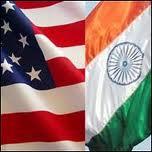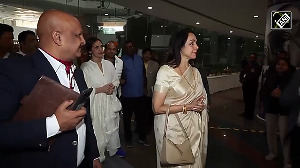The US Senate India Caucus will shortly write to President Obama urging him to push for a bilateral investment treaty with India, the Democratic co-chair of the Caucus, Senator Mark Warner of Virginia said here on Tuesday. Warner, who was co-hosting a Capitol Hill reception with his Republican co-chair Senator John Cornyn of Texas to honour India's new Ambassador to the US, Nirupama Rao, also lauded what he described as Prime Minister Dr Manmohan Singh's "brave action" in opening up India for foreign direct investment in the multi-brand retail sector.
Warner, who was co-hosting a Capitol Hill reception with his Republican co-chair Senator John Cornyn of Texas to honour India's new Ambassador to the US, Nirupama Rao, also lauded what he described as Prime Minister Dr Manmohan Singh's "brave action" in opening up India for foreign direct investment in the multi-brand retail sector.
"I also want to make a little bit of news today and announce that Senator Cornyn and I are sending a letter to President Obama calling for the administration and its Indian counterparts to accelerate negotiations on a bilateral investment treaty between the two countries," he said.
Warner argued that such a treaty was imperative because "It is needed from investors who from India choose to invest in the United States and vice versa-United States investors who choose to make FDI in India."
"I also want to acknowledge," he said, "the brave action of Prime Minister Singh which he took last week when he moved forward on multi-brand retailers access for FDI as well."
Then going on to explain the rationale for the Senate India Caucus, Warner said, "One of the challenges, or the opportunities we have in this Caucus, is to take the kind of friendship that exists between India and the United States and the remarkable amount of progress that has been made in terms of the large agreements made between our two countries and really broaden that into a true partnership."
He said the Caucus wanted to be the catalyst in this effort and "serve as a kind of conduit between both our friends in India and our friends here in the United States on how we in the Senate can really strengthen this friendship."
In this regard, Warner said the Caucus was intent on cutting through "some of the nitty-gritty issues around visas and cultural exchanges or educational opportunities and exchanges and not just around some of the large issues regarding defence sales, nuclear power-some of the issues that perhaps dominate some of the conversations in the past."
Cornyn, the original founder of the Senate India Caucus who has since its creation remained its GOP co-chair, recalled how he came to establish this Caucus. "It was shortly after I was elected to the Senate, when my friends in the Dallas Indo-American Chamber (of Commerce) began my education about the importance of ties between the United States
"Shortly after that, I had an opportunity to go to India and visit myself-the first of my two trips there," he said, and noted that when he came back "along with now Secretary of State, then Senator Hillary Clinton (New York Democrat), we co-founded the US-India Caucus and it has done nothing but grow since then."
But Cornyn joked that he always seemed to be losing his Democratic co-chairs. "I must be kind of hard on my co-chairs because they seem to move to other jobs-Senator Clinton now our Secretary of State, Senator Chris Dodd (of Connecticut, who succeeded Clinton, retiring from the Senate and now is chairman of the Motion Picture Association of America), who was the second co-chair, and now Senator Warner, has joined me in this great undertaking."
The Texan then went to speak on what he described as "this remarkable relationship" which he said, "Is one that is important to the United States because of the trade opportunities" as well as integral to Washington's "national security and global security and stability, particularly in the vital region that is occupied by India."
Cornyn said, "It's one reason why I am because of my concerns about national security and actually global security, that I am particularly glad to see that the Joint Statement issued after the second US-India Strategic Dialogue held in New Delhi recently, which reaffirmed our common commitment to concentrating on coordination and cooperation in Afghanistan, and also ensuring that Pakistan prosecute those responsible for the terrorist acts in Mumbai."
"And, of course, resuming bilateral negotiations on the investment treaty," he added.
Cornyn noted that "India is an important trading partner not only for the United States generally, but specifically for the state of Texas," and pointed out that "in Texas, we appreciate that our exports to India have grown from $1.6 billion in 2006 to $2.1 billion in 2010, and we look forward to continuing those important ties and connections."
He said in Texas, "I believe now we have 200,000 Indian Americans," but on the prompting of community activist Ashok Mago, who first took Cornyn to India at the time Mago was president of the Dallas Indo-American Chamber of Commerce, declared, "Maybe closer to a quarter of a million (Indian Americans) who call Texas home."
Then in a mighty pitch for his home state, Cornyn said, "We all have saying in Texas that 'I may not have been born there, but I got there as fast as I could.'"
Cornyn reiterated about the "strong ties with the Indian community, not only in Texas but around the country and of course, internationally."










